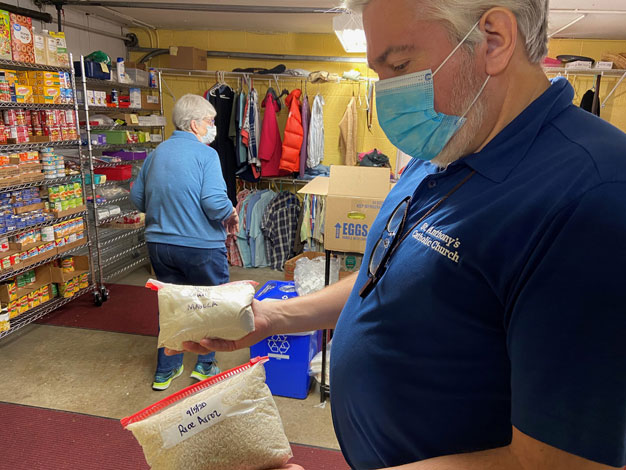
By Barb Arland-Fye
The Catholic Messenger
DAVENPORT — Chill nips the air on a September morning as people wait in line to choose groceries at a walk-up window outside a maintenance building converted into a food and clothing pantry at St. Anthony Parish. “Got coats here or not? It’s getting cold out here,” a middle-aged man says at the Plexiglas-protected window. Volunteers inside the pantry, wearing face masks, can hear the requests now that a baby monitor has been installed to amplify the voices from outside. Someone runs upstairs to get the man a coat.
A short distance away, people pick up meals in Styrofoam containers and bottles of water or iced coffee at the McAnthony Window outside another parish building. Meal servers push out the packaged meals with an extender — a PVC pipe — and roll out bottled water and iced coffee to help mitigate the spread of the coronavirus. Guests leave with their food or stand at high, butcher-block tables to eat.
The COVID-19 pandemic has reshaped and expanded the parish’s hunger ministry and that of many other food pantries, meal sites and food banks that serve people in need in Iowa. “We track hunger information across the state,” said Linda Gorkow, executive director of the Iowa Food Bank Association, which supports Feeding America food banks and their affiliates serving Iowa. “Because of the COVID crisis, need has continued to rise.”
While astronomically high unemployment rates at the start of the pandemic have dropped, many people remain without work or with reduced hours and struggle to make ends meet. The Quad-City Times reported Sept. 19 that the previous week 860,000 Americans filed new unemployment claims. Compare that to 2009, during the Great Recession when new jobless claims exceeded 620,000.
“There are about 40,000 more people in our service area who do not have enough food because of COVID-19,” said Mike Miller, president and CEO of River Bend Foodbank. Nearly 160,000 people do not have enough food in the 23 counties in eastern Iowa and western Illinois that the not-for-profit agency serves. That figure exceeds the peak of 141,000 people without enough food in 2009, during the Great Recession. “I am sad to report that we are now at the highest level of food insecurity ever,” Miller said during a media briefing earlier this month.
Related Reading: Hunger has become a middle class problem
In 2019, River Bend Foodbank distributed an average of 1.6 million meals per month. That figure grew to more than 2 million meals per month during the ongoing pandemic with monthly distribution records set in April, May, June and July. “To put that in perspective, in River Bend Foodbank’s 38-year history, our first 1 million meal month was in August 2016 and our first 2 million meal month was this past June,” Miller said.
August was not a record-setting month, perhaps because the demand is flattening or because of the derecho storm that devastated parts of Iowa on Aug. 10, Miller said. “The storm just added to the calamity that is 2020.” The brutal storm passed swiftly through the state but the pandemic remains. As a result, “we are back to one in seven people in our community without enough food,” Miller said, “and one in four children!”
While River Bend Foodbank’s costs jumped considerably to serve the needs, hundreds of new donors have emerged, which encourages and inspires Miller. “I am humbled by the community response, so many reaching out to help,” he said. People are more aware of hunger because of its growing impact. Hunger is no longer a problem of the poor alone. “It is a middle-class problem,” Miller said.
Supply and distribution challenges remain for the agency, which receives funding from individual donations, corporate partnerships and foundation grants. Miller said the agency has been able to keep ahead of the challenges to maintain inventory. St. Anthony Parish partnered with River Bend Foodbank on July 1, the same day the parish welcomed members of the former St. Mary Parish in Davenport as members of St. Anthony.
John Cooper, pastoral associate and business manager for St. Anthony, said the parish offered a limited pantry prior to July 1. With the partnership, the parish has expanded the quantity and variety of food items. A truck travels daily to River Bend Foodbank to pick up food (at a minimal price).
From July 1 through Sept. 15, the parish has provided 20,000 pounds of food to the hungry. McAnthony Window served more than 1,600 meals in August and the parish food pantry served about 2,180 persons. “It just keeps going up,” said parish secretary Tina Wagschal. The parish depends on donations from parishioners and others, along with dedicated volunteers, to feed the hungry.
On Sept. 18, Sister Bea Snyder, CHM, volunteered for the first time at St. Anthony food pantry after learning from parishioner Jeff Mason about the need for help. As she plucked cans of chicken and tuna and other food items off the shelves to fill grocery orders, she told a reporter, “I am so impressed with the thank-yous and the God bless yous I am hearing.”
Burlington food pantry sees lower numbers
Volunteers at the St. Vincent de Paul Food Pantry in Burlington, located on the property of St. John Catholic Church, report a reduction in the number of clients since the start of the coronavirus pandemic. The pantry has approximately 1,955 registered clients, but 680 have not visited the pantry this year, volunteer Larry Christ said.
Iowa Food Bank Association’s executive director says its partner food banks throughout the state have reported an increase in the number of people seeking help with food. That puzzles the Burlington pantry’s volunteers.
Jim Wade, president of the St. Vincent de Paul in Burlington, said the pantry previously operated in the church basement, but moved to the gymnasium on the property for more space. As coronavirus figures have spiked in Des Moines County, the pantry resumed curbside pickup for clients.
He said other food pantries operate in Burlington, which may explain the reduced numbers at St. Vincent de Paul. The pantry operates Monday through Friday, 1-3 p.m., and needs a few more volunteers to help. Call (319) 752-9332 for information.
How to help with hunger ministries
Like the Great Recession, the pandemic is going to be a marathon, not a sprint in alleviating and ending hunger, says Mike Miller of River Bend Foodbank. “As always it takes three things to make this happen: food, time and money.”
To help or to learn more:
• Visit the River Bend Foodbank website at riverbendfoodbank.org
• Visit the Iowa Food Bank Association website at iowafba.org
• Visit the Community Action of Eastern Iowa website at caeiowa.org or call (563) 324-3236
• Call the Iowa Food Bank Association food assistance hotline at 1-800-855-944-3663











